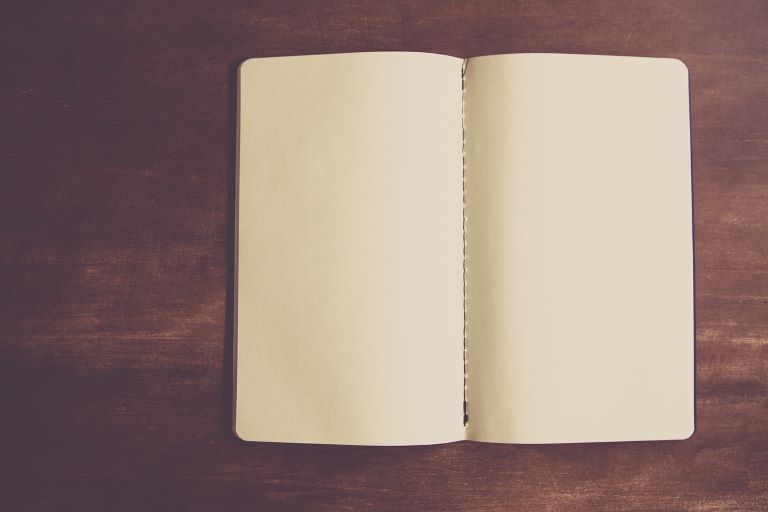I started journalling four years ago during an Introduction to Counselling Course. We were encouraged to keep a journal of reflections, and my journal has since become a constant companion with unexpected benefits.
I’d never really kept a journal before. I hated writing when I was young because it made my hand hurt (seriously), but this time round I had to keep one. To my surprise I found it very therapeutic. It helped me through periods of anxiety and depression, and keeping it gave me great insights into what was going on unconsciously.
Cultivating self-knowledge
This was the main reason for keeping a journal on the course. The idea was I would reflect upon anything that had bothered me, and my feelings about it. Were there any similar things that had happened to me in the past? Did the situation remind me of anything? What assumptions and judgements was I making? In terms of Person-Centred Counselling: were there any conditions-of-worth or introjected values at play? What was my organismic valuing process telling me? What about blocks to empathy and unconditional positive regard?
It felt really self-aggrandising to analyse the minutiae of my life like this, but once I got over the initial cringe I learned a lot about myself, and continue to do so.
Keep it private
This is a big one: you must keep your journal private. For a while I was writing as if for an invisible audience, but I found that in doing so I was self-censoring. Once I was comfortable and confident that no-one was every likely to read it, I could really let loose, exposing all kinds of unconscious biases, prejudices, fears, desires and anxieties that I had kept buried and never really admitted to.
When I realised I was self-censoring, I also realised I was judging myself and those things as, well, not-good. And if I’m judgy about those things to myself, I’m likely to be judgy towards others about those things too.
Helping a digital detox
When carrying my journal around with me, I found I was fiddling with my phone less. I could sit in a café and take some time out, quietly noting my thoughts.
This resulted in me having a considerable number of quiet sedate moments in cafés: I could sit with my journal and a coffee unnoticed without feeling I had to be somewhere else. I was journalling. I was doing something. It was also more lightweight and less ostentatious than whipping out a laptop in Starbucks. It is a great way of spending an hour or so.
I’ll write another post on digital detoxing later, but my journal was a useful part of that process.
Keeping a quiet mind
I found that once I’ve written something down, I don’t have to anxiously carry it around in my head. A journal provides me with additional “storage space”, rather like a mental rucksack. Once I’ve journalled my mind feels lighter and freer and less “buzzy”. I found myself becoming more “present” in everyday life instead of drifting off elsewhere into a world of my own thoughts.
Helping me sleep
A corollary of having a journal as a mental and emotional storage space is that it helped me sleep.
If I woke up in the middle of the night worrying about something, I could write it down and then fall asleep. I would be safe in the knowledge that I had it all written down; I could stop gnawing away at whatever-it-was like a dog with a bone and sort it out in the morning.
Finding the right journal
I’d had notebooks before, as I have a terrible memory and find that jotting things down helps me remember them, but they usually ended up lost and/or dogeared and falling apart. Some years ago my parents had given me a small Moleskine notebook for Christmas. It was a bit too good for shopping lists, but was absolutely ideal for portable journalling.
It had a number of features that I would strongly recommend for a portable journal. They may sound a little minor and nitpicky, but they do make a difference. The aim is to make journalling as effortless and as hassle-free as possible so that it becomes as second-nature as breathing or scrolling through your phone.
- Good quality paper makes all the difference. Your journal should be pleasant to write in; a small period of luxury, rest and respite amidst the hectic world.
- A small ribbon bookmark which makes it easy to find where you are without having to flip through it.
- A bit of elastic to hold it shut and stop keys and coins falling into it, making dog-ears and tearing pages, and also to stop it falling open if it falls out of your bag or pocket potentially revealing something personal, or getting grubby if it falls out on to something muddy.
- A flexible but sturdy hardback cover again, to keep things neat
- Rounded corners so it doesn’t chew holes in your jacket pocket or try to stab you if you bend over
- Unlined pages so you can feel free to write as large or as small as you like, or doodle and sketch
I always go for the Moleskine Classic Plain Paper Notebook, hardback, in the 9 x 14cm size. There are other sorts available, probably cheaper, but if I was to buy someone a small notebook for journalling, that’s the one I’d go for.
Credit: Image by Markus Spiske from Pixabay

